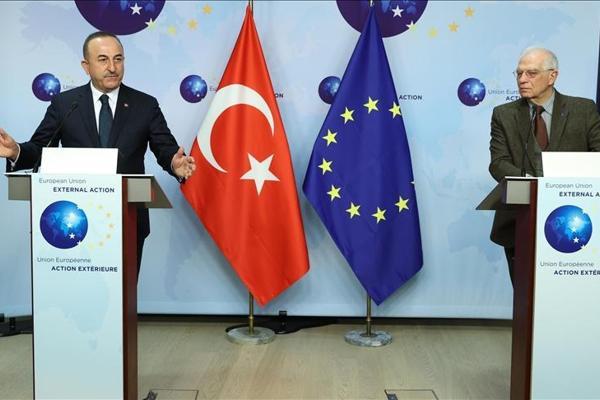Turkey, EU launch talks to renew migrant deal
BRUSSELS


Turkey and the European Union were set to discuss the renewal of a 2016 migration agreement during a meeting late on Jan. 21, Foreign Minister Mevlüt Çavuşoğlu said ahead of the meeting.
“We conveyed our proposal to update the migration agreement. We will discuss the details of this,” Çavuşoğlu said at a joint press conference with the bloc’s foreign policy chief, Josep Borrell, ahead of their meeting in Brussels.
Çavuşoğlu recalled Turkey’s proposal to hold a multilateral conference regarding problems in the eastern Mediterranean, noting that he would discuss the matter with Borrell.
Turkey and the European Union will also “evaluate the concrete steps they can take in the upcoming period, including visa liberalization and updating the customs union agreement,” he noted.
“It is important to establish a positive atmosphere in Turkey-EU ties, and concrete steps are needed to make it sustainable,” the minister said.
A political will has emerged from both sides to create a more positive atmosphere in EU-Turkey ties following the release of a joint statement at the bloc summit last month, Çavuşoğlu said, noting that both sides had made mutual positive statements to better relations. “We provided a better opportunity for dialogue. That’s why I’m in Brussels today,” Çavuşoğlu said.
The minister said he was in Brussels to hammer out the details for a visit by EU chiefs Ursula von der Leyen and Charles Michel to Turkey following an invitation from President Recep Tayyip Erdoğan.
There are serious problems in the region, meaning Turkey-EU cooperation is vital in the search for a solution, the minister said.
Borrell, meanwhile, said Turkey and the European Union had started the new year in a positive atmosphere and that bloc welcomed the resumption of talks between Ankara and Athens on their competing territorial claims in the eastern Mediterranean.
“We have seen an improvement in the overall atmosphere. We strongly wish to see a sustainable de-escalation in the eastern Mediterranean,” he said.
Stating that Turkey and the European Union could act in mutual understanding, Borrell said: “Our relations are based on mutual interests. I hope we can work for a relationship that further progresses and maintain cooperation.”
Tensions between the union and Turkey reached new levels last year after Ankara sent a ship to search for gas deposits in the eastern Mediterranean, angering the bloc and its member states Greece and Greek Cyprus.
But, in the weeks after Turkey withdrew the vessel, the Oruç Reis, in November 2020 and Brussels announced plans to expand sanctions last month, both sides have softened their rhetoric.
In an important move, Turkey and Greece agreed to hold exploratory talks on their maritime dispute in Istanbul on Jan. 25, resuming consultations that were suspended in 2016.
In March 2016, Ankara and Brussels reached a deal to stop irregular migration across the Aegean Sea and improve the conditions of more than 3 million Syrian refugees in Turkey.
However, Turkey often raises concerns about the European Union’s reluctance to take in refugees, as well as bureaucratic hurdles in receiving promised funds – 6 billion euros ($6.5 billion) – for refugees.
Turkish politicians also criticized their European partners for not fully implementing the 2016 deal that also included political commitments, including visa liberalization for Turkish citizens traveling to Europe, opening new chapters in the accession process, and launching negotiations on upgrading the EU-Turkey Customs Union.
